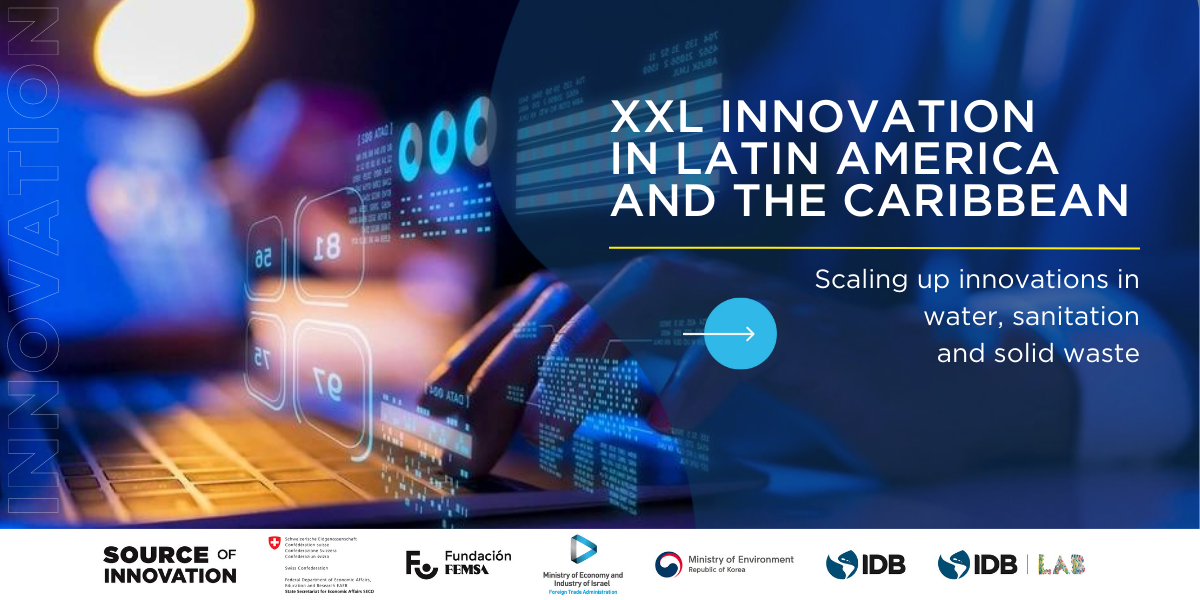By: Xoan Fernandez
Water, sanitation and solid waste utilities need innovation to overcome challenges. It is not enough to develop new, effective solutions; these must be implemented quickly on a large scale throughout the region. Which, of course, is easier said than done.
At the IDB Group’s Source of Innovation, we believe that the first step is to determine the main factors that facilitate the scaling up of innovations within our operations. Based on our analysis, client ownership, internal leadership, and straightforward administrative procedures are the most important enablers.
- Client ownership of the solution. Utilities should have “skin in the game”; they should come up with the innovative solution and be responsible for its implementation. When an external party provides a solution, it is often perceived as a gift or even an imposition that does not need follow-through.
- Internal champions. Going against the status quo and embracing new ideas requires trust. Upper-level decision-makers should promote, be excited about, and believe in the innovative solution. They should also have the negotiation skills to involve other departments, since most innovations cross bureaucratic divisions.
- Administrative mechanisms that facilitate technology and innovation. Despite political will, utilities’ administrative and fiduciary mechanisms often inhibit the implementation of solutions. To determine whether an innovative solution should be adopted, it is vital to analyze how it can be scaled up, given the company’s current procedures.
Other relevant factors include:
- Solutions that are adapted to the capabilities of the utility (not the other way around). Although some frontier solutions may offer great results, utilities must have the basic capabilities (i.e. sensors, trained personnel, experience with similar tools) to absorb them. Otherwise, they cannot be used routinely.
- A clear business case. Most of the regions’ utilities are underfunded, so their ability to invest in new solutions is limited. In addition to a technology or operations case, there must be a business case that answers the following questions: what benefits will the utility have? how long will the solution take to pay for itself? how will it help cut costs? etc.
- Training and technical support during implementation. Great effort is required to introduce a new technological solution, but the key to its long-term success depends on the availability of ongoing support, technical assistance, and its adaptability to different circumstances. When a new solution is supported during its entire life cycle, the risk to the operator is reduced and it is more likely to be accepted.
- Ability of the operator to identify needs and select appropriate solutions. Utilities face many operational challenges and the abundance of available solutions can be daunting. They frequently lack organized procedures to identify problems and potential fixes, which leads to poor and costly decisions on whether or how to intervene.
- Availability of resources to carry out pilots. Utility services are highly sensitive and need to be tested technically, socially, and economically before full deployment. Having the resources and strategies to carry out pilots promotes greater quantity and speed of adoption of innovations.
The adoption of innovation by a sectoral service provider depends more on endogenous factors, such as the capacity to integrate innovations, than exogenous factors like the existence of solutions, their quality or funding sources. At Source of Innovation, we want to support endogenous capacity building to guarantee universal water, sanitation and solid waste services that improve lives in Latin America and the Caribbean.
About Source of Innovation
Source of Innovation is an alliance of the IDB Group with external partners to promote the development and adoption of innovative solutions in the water, sanitation, and solid waste sector to achieve smart, inclusive, and sustainable services, with a focus on service providers in Latin America and the Caribbean.
Source of Innovation is funded by the Government of Switzerland through its State Secretariat for Economic Affairs (SECO), by the FEMSA Foundation, by the Republic of Korea through its Ministry of Environment, and by the Government of Israel. The alliance is also complemented by direct contributions from IDB Lab and the Water and Sanitation Division of the IDB.
Guest Author
Xoán Fernández is an expert in innovation for development and social innovation with more than 12 years of work experience in Europe, Latin America and the United States. He has worked in several innovation labs of multilateral development banks, designing, managing and advising innovation projects with entrepreneurs, NGOs, companies and governments using disruptive models and technologies. Fernandez currently supports the water, sanitation and solid waste innovation initiative, Source of Innovation. He holds a Master’s degree in Innovation for Sustainable Development from the University of Sussex/SPRU and training in ICT, communication and knowledge management and has been recognized as a Responsible Leader by the BMW Herbert Quandt Foundation. Moreover, and is a researcher in Innovation for Development at the Polytechnic University of Madrid.


Leave a Reply